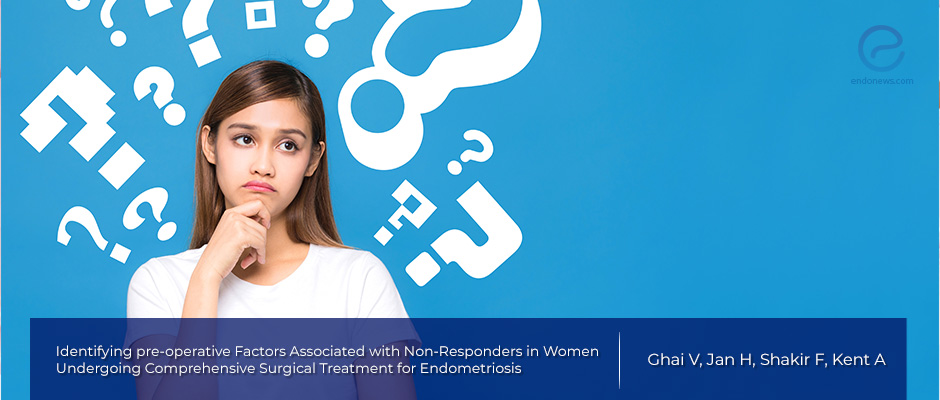Preoperative factors to predict unresponsiveness in women undergoing endometriosis surgery
Apr 8, 2019
The severity of pain experienced preoperatively is the only predictive factor associated with non-response for surgery.
Key Points
Highlights:
- Women with endometriosis may fail to improve especially in terms of pain despite comprehensive surgical treatment approaches.
Importance:
- Health outcome measures can be used in women managed with comprehensive surgical treatment methods for endometriosis to understand changes in quality of life.
What’s done here?
- This cohort study evaluates the predictive factors for non-response to be used in women undergoing endometriosis surgery includes data from two trials performed between 2007 to 2014.
- The first study was a single-center prospective cohort study evaluating laparoscopic surgery for severe recto-vaginal endometriosis, the second was from a double-blind randomized controlled trial evaluating women who underwent CO2-Laser versus harmonic scalpel approach.
- The primary outcome of these trials was the assessment of pelvic pain and quality of life (QuOL). Visual analog scales (VAS), Endometriosis Health Profile 30 (EHP-30), Gastrointestinal Quality of Life Index (GIQLI), EuroQol-5 (EQ-5D) and Hospital Anxiety and Depression Score (HADS) questionnaires were used twice, preoperatively and at 12 months postoperatively.
- The surgical method was determined by the type of disease. Laparoscopic peritoneal excision or laser ablation was to treat superficial disease, whereas laparoscopic bowel surgery (shave, disc or segmental resection) with/without concomitant total hysterectomy and BSO were performed for deep infiltrating endometriosis involving the bowel.
- EHP-30 is reliable and user-friendly, higher scores indicate a poorer health status; while for GIQLI, that enables the assessment of bowel function; lower scores are indicative of poorer status.
- EQ-5D is used to assess the quality of life outcomes by a descriptive and visual analog system, higher scores indicate a better quality of life as in GIQLI.
- HADS, evaluating anxiety and depression; and VAS (used to assess chronic pelvic pain, dysmenorrhea, dyspareunia, and dyschezia), higher scores are indicative of more severe symptoms.
- Non-response was defined as no improvement or worsening pain scores postoperatively.
Key results:
- A total of 198 women who met the criteria were included. 96 women underwent surgery for rectovaginal endometriosis, 102 had been operated for a superficial disease.
- 17.85% of women (24.51% with superficial endometriosis and 10.41% of women with deep endometriosis) had been identified as non-responders at 12 months postoperatively.
- No significant predictive factor of unresponsiveness could not be detected in women with superficial endometriosis using all of these scores.
- In women with advanced deep infiltrating endometriosis, only two significant predictive factors which are less preoperative pain and feelings were found to determine for predicting non-response.
- If radical bowel surgery was performed in women with severe endometriosis, the rate of non-response was more likely compared to conservative bowel surgery.
- Concomitant total hysterectomy and BSO did not change the results of unresponsiveness.
Strengths and Limitations
- The strength of the study is that it is the first study investigating the unresponsiveness in endometriosis surgery.
- The retrospective design could be a limitation of this study.
Lay Summary
Endometriosis is defined as the localization of endometrial glandular and stromal cells outside the uterine cavity. Despite extensive research, the optimal management of endometriosis still remains unclear. Several treatment options include analgesic medication, hormonal treatments, and surgical intervention. There is still a risk of relapse despite extensive surgery for endometriosis.
Ghai et al, a group of scientists from the United Kingdom, published a study titled as “Identifying pre-operative Factors Associated with Non-Responders in Women Undergoing Comprehensive Surgical Treatment for Endometriosis” in the "Journal of Minimally Invasive Gynecology".
The authors sought to evaluate the factors to predict non-responsiveness in women who underwent endometriosis surgery. They performed a secondary analysis of data from two trials using VAS, EHP-30, GIQLI, EQ-5D and HADS preoperatively and at 12 months postoperatively.
Women treated for superficial endometriosis were more likely to be non-responders compared to those treated for advanced endometriosis, and no predictive factor of unresponsiveness could be detected in women with superficial endometriosis using all of the above scores.
However, in women with severe and advanced endometriosis, only two significant predictive factors predicted non-response: less preoperative pain and feelings.
The authors suggested the severity of pain as the only factor associated with non-response. “A holistic approach needs to be adopted by health professionals that address physiological, psychological and social aspects of pain management,” they added.
Research Source: https://www.ncbi.nlm.nih.gov/pubmed/30885782
endometriosis rectosigmoid endometriosis superficial endometriosis recurrence non-response pain improvement rectal shaving discoid resection segmental rectosigmoid resection visual analogue scales (VAS) Endometriosis Health Profile 30 (EHP-30) Gastrointestinal Quality of Life Index (GIQLI) EuroQol-5 (EQ-5D) and Hospital Anxiety and Depression Score (HADS)

